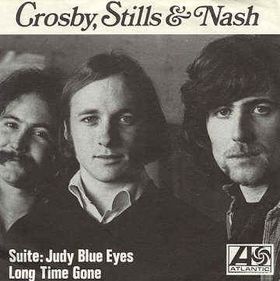 | Suite: Judy Blue EyesCrosby, Stills & Nash |
Writer(s): Stephen Stills (see lyrics here) Released: September 1969 First Charted: October 4, 1969 Peak: 21 US, 15 CB, 18 HR, 1 CL, 11 CN, 50 AU, 2 DF (Click for codes to charts.) Sales (in millions): -- Airplay/Streaming (in millions): -- radio, 25.50 video, 114.51 streaming |
Awards:Click on award for more details. |
About the Song:David Crosby, Stephen Stills, and Graham Nash already had an impressive pedigree before they united as one force. Crosby had been with the Byrds, Stills with Buffalo Springfield, and Nash in the Hollies. For their new folk-rock trio, they brought “together their prodigious songwriting skills and amazingly complimentary voices” UCR that truly deserved the supergroup label. The collective reportedly first sang together at – depending on which band member you talk to – either the home of Joni Mitchell or Mama Cass Elliott. They started harmonizing, most likely on “Suite: Judy Blue Eyes,” TM a tune Stills penned about the demise of his relationship with singer Judy Collins. And yes, she does have blue eyes. Collins said that he came to her hotel one night when she was on the West Coast and sang the song for her. She said, “Oh, Stephen, it’s such a beautiful song. But it’s not winning me back.” WK The title was a play on words referencing the song’s four-part medley. “The roughly three-minute-long first movement could be a self-sufficient pop song in its own right. But it keeps building for close to seven minutes – first to a section of Stills’ vocal solos and finally to the ‘doo doo doo’ coda and tight three-part harmonies that have come to define CSN (and sometimes Y).” TM “The epic track…came together very quickly, with Stills recording the basic guitar track not long after arriving at the studio.” UCR Engineer Bill Halverson said, “It still gives me goose bumps when I listen to that recording, aware that he blew through seven-and-a-half minutes with all the time changes, all the pauses, all the everything in just one take…No edits, no nothing.’” UCR He “thought he had ruined Stills’ magic by over-brightening the guitar sound, leaving no low end. ‘I had totally overdone the sound, but Stephen was totally into what he was playing,’ Halverson said, ‘and just when it looked like he was going to stop, he started another section and played some more. By now, my whole life was flashing in front of me, and certain that my career was over, I began to sweat.’” UCR “Luckily, Stephen liked what he heard. Millions of fans agreed.” UCR Resources:
Related Links:First posted 8/1/2022; last updated 4/25/2024. |








No comments:
Post a Comment